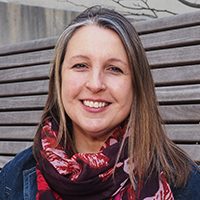by Rose Bender Cook
Being an effective leader is hard work. Healthy leaders with integrity, humility, courage, and vision seem rare. In our current political arena, power conflicts and personal agendas prevent collaboration and creative problem-solving. In our congregations, conferences, and denomination, we have similar challenges. It’s a difficult time to lead. Leaders need our prayers.
This year, I started the Doctor of Ministry (D.Min) in Leadership program at Anabaptist Mennonite Biblical Seminary (AMBS). Initially, I spent time assessing my strengths and weaknesses and realized I have blind spots I don’t even recognize yet. As I look back over 13 years as a pastor at Whitehall (PA) and reflect on my new position at Mosaic, I am humbled. This is sacred work. I want to be effective, but even more, I want to be faithful.
Scripture teaches us much about leadership. I am convicted when I read about Moses’ workaholism, over-functioning, and lack of time with family which had to be corrected by his father-in-law (Exodus 18). I identify with Elijah’s repeated narrative that he was the only one left to do God’s work (1 Kings 19). I am challenged by Esther’s courage to be a voice for her people at great personal risk (Esther 8). I am inspired by Peter’s willingness to adapt when he witnessed the outpouring of the Spirit at Cornelius’ home (Acts 10).
Then, there is Jesus. His times of prayer grounded him so that he wasn’t swayed by the pressure of the crowd (Mark 1: 35-39). He was focused on the plan of the Father, and yet flexible, stopping to raise the son of the widow of Nain (Luke 7) and healing the daughter of the Syrophoenician woman (Mark 7).
As a part of the D.Min program, I was asked to develop a vision statement for my leadership growth. After prayer, discernment, and some fear and trembling, I submitted this:
To be grounded, gracious, and Spirit-led–opening space for everyone to take their place at God’s table.
Each part of that vision invites me to growth and into spaces that are uncomfortable. I wonder if I can live up to this call. Will I apply the discipline it takes to stay grounded? Will I grow in joyful patience and generous love so I can be truly gracious? Will I surrender my ego and agenda to follow the Spirit’s prompting?
Will I be able to imagine the big table of God (Luke 13: 29-30; 14:21-23) which looks different from the table I would set? How will I clear space for those who have no power to share their voice? How do I welcome others as Christ has welcomed me? (Romans 15:7) How do I love the stranger, the enemy, as well as the brother or sister who comes from a different theological perspective than I do?
There are plenty of times where it seems easier to throw in the towel on this leadership journey. According to the scriptures, I am in good company. But I serve a God who is faithful, who always provides what is needed to live into the call we’ve been given.
I pray for discernment as I listen to the Spirit and for the courage to obey. As I relate to other leaders and those in my care, I want to be loving, tender-hearted, and humble (1 Peter 3:8). This is God’s church, God’s table, God’s mission, and I have been invited to join. Instead of relying on my own leadership abilities, I will trust fully in the One who began this good work and will bring it to completion (Phil 1:6).

Rose Bender Cook
Rose Bender Cook is the Leadership Minister for Formation and the Mosaic Institute Director. She is also a pastor at Whitehall (PA) Mennonite Church.
The opinions expressed in articles posted on Mosaic’s website are those of the author and may not reflect the official policy of Mosaic Conference. Mosaic is a large conference, crossing ethnicities, geographies, generations, theologies, and politics. Each person can only speak for themselves; no one can represent “the conference.” May God give us the grace to hear what the Spirit is speaking to us through people with whom we disagree and the humility and courage to love one another even when those disagreements can’t be bridged.
